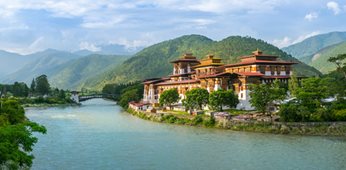
Has the tiny Himalayan nation of Bhutan discovered the secret to happiness?
They will be the first to know if they have; they measure it constantly. Bhutan is as famous for its benchmark “Gross National Happiness” as it is for its breathtaking scenery and colorful festivals. With this value at the core of everything the government does for its people, the Bhutanese have managed to tackle almost all of the applicable millennium development goals, while also preserving their unique heritage and their pristine environment.
Gross National Happiness (GNH) was introduced as Bhutan’s preeminent national goal in the 1970s by progressive and pioneering King Jigme Singye Wangchuk. The king, who also ceded his autocratic powers to a National Assembly, deliberately chose a path to wellbeing for his citizens that did not lie in material wealth. Gross National Happiness, the Bhutanese believe, is achieved by assiduous attention to four key pillars:
1. Sustainable Development: Since the 1960s, Bhutan has built roads that crisscross the heavily forested rugged terrain of this mountainous nation, established schools, hospitals, telecommunications, and other social services. Bhutan is entirely powered by hydroelectricity and the government supplies solar panels to those in remote locations.
2. Environmental Protection: Bhutan’s pristine nature and unique flora and fauna are protected by strict governmental regulations that impose serious fines for any infraction. 60% of the land in Bhutan must remain forested and today more than 70% remains so. No plastic bags are allowed inside the country, and the penalty for killing an endangered species is life in prison. In an effort to avoid the mass low end backpacking tourism that has overrun neighboring Nepal, Bhutan has developed a “high value/low impact” policy that limits the number of foreign tourists who visit Bhutan yearly and imposes a mandatory $250.00/day minimum spend per person.
3. Good Governance: Bhutan remains a constitutional monarchy, in which the sovereign rules in tandem with local and national assemblies. The current king, Jigme Khesar Namgyel Wangchuck has reigned since 2006 and is wildly popular - a good thing, since Bhutan’s laws stipulate that any monarch can be forced to abdicate to his hereditary successor if the National Assembly assembles a two-thirds majority for a vote of no-confidence against him.
4. Cultural Preservation: Thanks to government policy, Bhutan’s ancient culture can be seen everywhere, from the colorful national costumes that are mandatory for government employees and school children to the enduring traditions of lively tsechus or festivals and the serious rivalry at village archery ranges, where Bhutan’s popular national sport is widely practiced. Each of the 2,000 temples: be they sprawling dzhongs or small local temples is protected and preserved by the government to ensure that this cultural heritage survives.
Tantric Buddhism is not merely the national religion of Bhutan, it is a way of life that knits together the gentle people of Bhutan, their passionate belief in the spirituality of nature, and their commitment to strict vegetarianism out of the moral conviction that killing any living thing is against their principles. Prayer flags flutter in the crisp wind and houses proudly sport colorful symbols of phalluses, symbols of “The Divine Madman,” who wards away evil spirits. This appears to be all the protection the Bhutanese require: there is very little crime or violence in Bhutan. Out on a walk in Thimphu one afternoon, I was surprised and delighted to meet schoolchildren as young as five, walking home for lunch with no supervision. They were equally delighted to practice their excellent English with me.
Visiting Bhutan offers a unique opportunity to pause and reflect in the heady air of the Himalayas about what happiness truly is and how we might all emulate Bhutan in striving towards it.
Join Alexander + Roberts on an unforgettable, unhurried, and very happy Spirit of Bhutan journey on our
flexible, private itinerary for you and your party. Speak to our knowledgeable reservation agents about this, and other tours to the Himalayas.